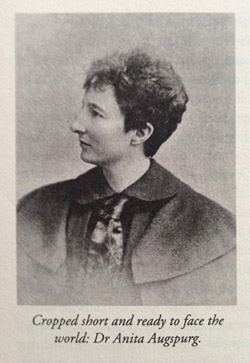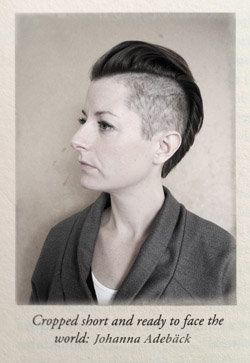|
Dear Irene,
Today I've got a haircut by one of the other guest artists. There is something special about getting your hair cut by someone who's not a hairdresser. It's more intimate and private in some way. To get a haircut means to surrender into the hands of someone else, to trust another human being who has a sharp pair of scissors in her hand, and to trust that this person wants you well. I usually close my eyes. Not only to avoid getting hair in them, but also because it's easier to relax and let go of control. Then, I can just feel the hand on my head that occasionally steer softly but firmly, more to the side, up or down. Then, I can only hear the sound of the metal of the scissors when the two edges come together and cut the hair between them.
Schtjyck, schtjyck.
Schtjyck.
The funny thing is that earlier today I was flipping through a book I found in a bookcase here. In that book there was a section on women activists and women's struggles around the turn of the century. In this section my gaze was fixed on a photo of a woman with short hair. The caption said "Cropped short and ready to face the world: Dr. Anita Augspurg". As I sat in the kitchen and my hair fell down on the floor, I had no thought of this picture, but it came back to me later. Was I inspired without thinking about it? I did indeed need to cut my hair, but why today?
In the 1880s Anita moved to Munich, where she moved in with another woman, Sophie Goudstikker, and opened a photography studio. Business was good and they were both famous and infamous.
”The fact that two women in their early thirties were living together, were successful in business and claimed their independence, two women with short hair – think of it, in the eighties of the last (nineteenth) century – that they kept stimulating, interesting company in their home and publicly fought for women's liberation; two women who engaged in sports, rode horses and bicycles, went rambling and generally lived as they pleased – all this caused great consternation in Munich.”
But Anita gets tired of Munich and her relationship with Sophie runs out. She decides to study law. She does this in Zurich at the only university that provides degree to women. Eventually, she will move to Berlin, where she lives with Lida Gustava Heyman and continues her political work in the fight for women and their rights. This means, among other things, that she serves as editor of the Zeitschrift für Frauenstimmrecht (Newspaper for women's suffrage), where she uses provocation as method over rational argumentation which she realized didn't bite on the German power elite.
A story told in the book is about a Swedish art student who is arrested for prostitution when she was walking alone with a man. This event is raised by the activists and Anita Augspurg manages to get herself arrested by a suspicious police officer only to highlight the issue. The first time I saw the picture of Anita and read the caption, I thought it was humorous. "Cropped short and ready to face the world" sounds so pompous, romantic and fun. But with the picture set in context, the laughter got stuck in my throat. I suppose it's in a way wonderful that I take it as self-evident; my rights and my short hair. But at the same time it was not so long ago Anita was alive and that she, along with other women, had to fight hard for what I take for granted. Unfortunately, it is not self-evident to everyone yet. I'm fortunate. And grateful.
You are an amazing woman Irene and I admire you in many ways. I look forward to a glass of wine with you, soon.
Love,
Johanna
|



